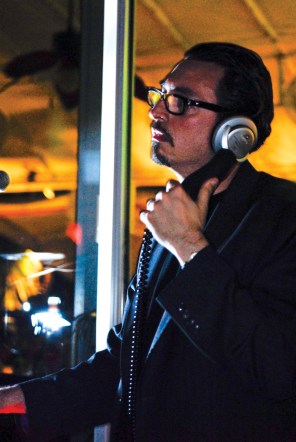Eric Kupper – Bringing the House Home
I first got to know Eric Kupper during a car ride through Naples, Italy. He was the DJ, I was the interpreter. “Yes You Do” was the song Lunare Project was putting out with Kupper and its release party, their reason for flying in one of the biggest figures in house music history.
After a carousel of phone calls, I was waiting in the Hotel Palazzo Caracciolo parking lot, then in a lobby so abundant in mirrors, Bruce Lee would have fallen cast to dizzy spells.
Enter the DJ.
What sauntered out was clearly more than just a serious chunk of house music history. Though the name doesn’t proceed the man, Eric Kupper’s thirty-odd years of work in all facets of the music industry has resulted in over 2,000 records. 2,000 and constantly counting. On top of a boiled down figure of an album a week, his array of credits in the studio span from Aretha Franklin, to Depeche Mode, to RuPaul.
A sort of musical Everyman.
It was 3:30 in the afternoon when Kupper came down, clad in black. Standing behind him, he would have looked like a Magritte painting—his black blazer and pork pie hat contrasting a Neapolitan afternoon—however the amount of mirrors in the lobby made it impossible to only see a figure. There was even more left unsaid. His charisma wasn’t that of Muhammad Ali. His charm wasn’t Gregory Peck’s, but there was something all together paradoxical and charismatic about Kupper. The all-black suit. The mustache reminiscent of a Barnum & Bailey strong man. A type of charisma that was neatly wrapped up into a simple, “Nice to meet you. I’m Eric.”
Between anecdotes about Neapolitan traffic—head of Lunare Project, Roberto Barone explained that when seat belt laws were introduced in Italy, Neapolitans took to mass producing t-shirts with safety belts printed across the chest—we found numerous points and places we had in common. Conversation migrated across the 41st parallel to New York and up to Fairfield County, subsequently forcing rough translations about hot dog stands in Bridgeport, Connecticut.
 Eric Kupper was born in the Bronx. As a young child, his parents gifted him with a keyboard, leading him to his lifelong career in music. Like his colleague Moby, Kupper’s years as a fledgling New York musician were centered around the tail end of an already fading punk scene. The early eighties were a transition period in the city’s underground music movements, and New York City’s playground was wide open. When the novelty of NYC’s music club, CBGB began to teeter on irrelevance as the East Coast punk scene was packing its bags for Washington DC, Kupper was left staring into the proverbial horizon for whatever was coming next. What arrived was house music.
Eric Kupper was born in the Bronx. As a young child, his parents gifted him with a keyboard, leading him to his lifelong career in music. Like his colleague Moby, Kupper’s years as a fledgling New York musician were centered around the tail end of an already fading punk scene. The early eighties were a transition period in the city’s underground music movements, and New York City’s playground was wide open. When the novelty of NYC’s music club, CBGB began to teeter on irrelevance as the East Coast punk scene was packing its bags for Washington DC, Kupper was left staring into the proverbial horizon for whatever was coming next. What arrived was house music.
By the mid-eighties, Kupper had already established himself as a studio musician…as an artist. He kept busy producing and laying down keyboard tracks for the bigger names in the genre. It was in 1989 that he first collaborated with “The Godfather of House” – Frankie Knuckles. It would be a partnership and friendship that would last until 2014 when Knuckles was taken by Type II diabetes. What started as studio collaboration for a Def Mix song, led to some of the genre’s most definitive works, from “Hercules” to a remix of Donna Summer’s “Hot Stuff.” In 2009, Kupper and Knuckles formed a duo called Director’s Cut. Despite Knuckles’ face being synonymous with house, Director’s Cut was made of two equal parts, recording and working long distance on what would later be recognized as some of the most brilliant pieces coming out of the genre.
The duo’s working relationship continued to function despite the long distance between the two. Knuckles had been living in Chicago for years and Kupper had since moved from New York. By 1995, Kupper had started a family and wanted to withdraw from city life. “We had one kid in the city, and we wanted to have a second one. We figured, ‘let’s get a house,'” says Kupper.
 After scouring the Tri-State area, it was settled. The Kuppers fell in love with Weston, Connecticut and the little cottage on two acres of woods where Kupper has since resided. “This area of Connecticut just felt like home,” he says. “I live not far from the Saugatuck Reservoir. It’s just beautiful. It’s just breathtakingly beautiful. Come fall, you can take some picture postcard style shots there. It’s not too far from the city, yet you feel totally removed. I really love it up here.”
After scouring the Tri-State area, it was settled. The Kuppers fell in love with Weston, Connecticut and the little cottage on two acres of woods where Kupper has since resided. “This area of Connecticut just felt like home,” he says. “I live not far from the Saugatuck Reservoir. It’s just beautiful. It’s just breathtakingly beautiful. Come fall, you can take some picture postcard style shots there. It’s not too far from the city, yet you feel totally removed. I really love it up here.”
Being a man who bangs out an album every week, the Woody Allen of House couldn’t not bring the music home with him. Hence the birth of his own record label. Named after Kupper’s experience in the music business, Hysteria Records was born. The idea was to bring the hysteria of the industry home, but in name only. Though the label puts out artists from all over the world, Kupper maintains the fact that Hysteria is completely home-base rooted. In what started as the room his kids, now 20 and 23, used to play in, over time it was transformed into one of the most productive little corners in the state.
“I have a more proper recording studio across the way, then I have the corner of my living room, which is actually what I use most of the time.”
The studio that snuck into his living room turned out to be exactly what allows Kupper to lead his everyday double life. While in New York, Ibiza, Chicago, Naples, he’s Eric Kupper the DJ. The producer. The history of house music incarnate. In Weston he can be everything else from dad, to self-proclaimed amateur chef, to just a guy bending an elbow at the local bar.
“Most people don’t know what I do (although they often assume I am somehow involved in the arts), unless they are into house music. I wouldn’t want any special treatment. When I go with my friends to my local bar for a beer, I’m just one of the gang. Which is how it should be.”
Which is how it should be.






















